Last month Governor Jerry Brown decided that water conservation standards could be reduced, despite 95% of the state still being in some level of drought. With these reductions, homeowners were allowed to increase their landscape irrigation.
We discovered however, that interest in residential recycled water fill stations has increased as well and with it, demand is growing once again. Hauling recycled water saves drinking water and “it’s the right thing to do.”
This month we’ve taken a different approach to our normal fill station stats article. We’ve reached out to a few of the agencies that provide data to this blog to ask a simple question “What else does <agency name> do with recycled water?”
The results blew our socks off.
We have learned that Residential Recycled Water Fill Stations are only a small piece of the pie.
#DYK there are more residential #recycledwater fill stations in #NorCal than #SoCal? https://t.co/wDBLd3TaXH pic.twitter.com/V7GE2Dlpvd
— Recycled H2O (@recycledh20) June 12, 2016
Irvine Ranch Water District
Located in the heart of Irvine, IRWD serves high-quality drinking water to over 370,000 residents. They also collect, treat and create recycled water from homes and businesses in their service area. Between the two recycled water treatment plants they operate in Irvine and Lake Forest, they “deliver approximately 25 million gallons per day of recycled water throughout the service area,” said Matthew Veeh Public Affairs Manager at Irvine Ranch Water District.
“Many of our HOA communities are dual plumbed for irrigation. Most of our new communities that get built are also dual plumbed for irrigation. Finally, we are installing dual plumbed systems into some of our commercial properties and new commercial developments as well.”

When it comes to water use reductions from the state, residential haulers are not slowing down. For the month of May, IRWD distributed 17,800 gallons to 218 registered users. Since September 2015, IRWD customers have hauled 117,800 gallons of recycled water.
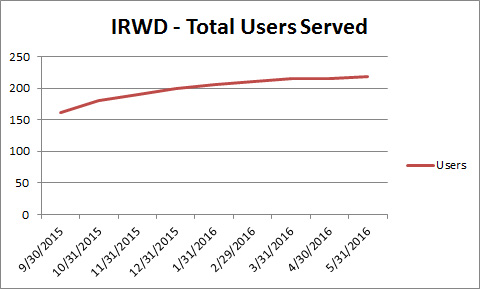
Month over month the volume of water picked up as steadily increased. “We will continue to make the fill station available to our customers and are encouraged by the recent increase in overall use at the station.”
City of Fresno
Newly information recently became available to RecycledH2O from the City of Fresno Extraction Well Water Fill Station program. The Fresno-Clovis Regional Wastewater Reclamation Facility is operated by the City of Fresno and provides wastewater treatment services to the greater Fresno metropolitan area, including portions of Clovis and some areas of Fresno county. Their treatment plant receives 68 million gallons of wastewater a day. The City of Fresno built its first sewer line, a 24″ outfall in 1891 to let sewage spread across acres of isolated land. In 1907, eight septic tanks were built to provide partial treatment before land spreading and irrigation of alfalfa crops. They have a very storied history, which I invite you to read.
The extraction well water program provides free groundwater for residential customers to offset the use of drinking water for non-drinking uses. Details to frequently asked questions can be found in the Extraction Well Water Use – Applications & Agreement for Residential Customers.
How does this work? Extraction well water is water that percolates from disposal ponds where treated wastewater is placed. The soil provides additional filtration treatment resulting in good quality water that is safe for non-drinking uses.
Extraction well water is just another form of recycled water, just this one has a spent some time in the ground.
Since their fill station opened on July 8, 2015, 198 customers (169 residential and 29 commercial) have enrolled in their program. They have taken 6,920,000 gallons of extraction well water, which has been used for landscape irrigation, dust control, soil compaction and vehicle washing.
Las Virgenes Municipal Water District
“For us in southern California, the drought is not over,” said Brett Dingman, Water Reclamation Manager at Las Virgenes Municipal Water District.
LVMWD provides potable water, wastewater treatment, recycled water and biosolids composting services to more than 65,000 residents in Agoura Hills, Calabasas, Hidden Hills, Westlake Village and unicorporated areas of western Los Angeles County.
Each day, over 70% of the wastewater flow to the treatment plant is filtered into approximately 8 million gallons of recycled water. This water is then pumped out over their extensive recycled water distribution system. “The recycled water fill station offers a chance for residential customers to take advantage of recycled water to irrigate their plants.”
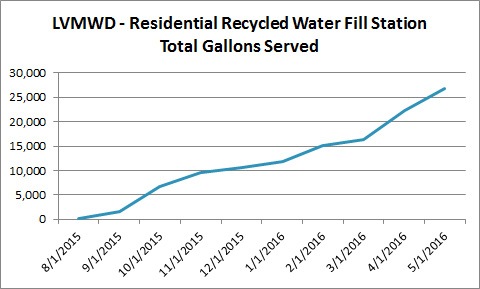
Last month, 42 customers picked up 4,630 gallons of recycled water. This brings their total volume distributed to 26,854 gallons.
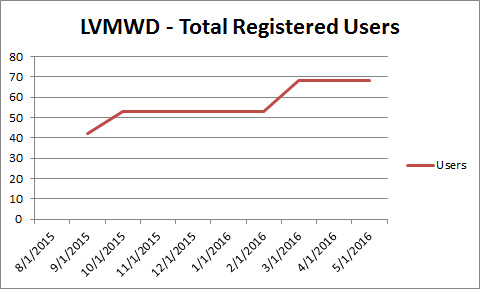
“The amount of water given away at the fill station is insignificant when compared to our recycled water distribution system, but it helps to shift the public’s perception from looking at recycled water as ‘sewer water’ to looking at is as a resource.”
Sacramento Regional County Sanitation District (Regional San)
Sacramento Regional County Sanitation District (Regional San) is the largest wastewater treatment plant on our list. They “provide wastewater conveyance and treatment services in the unincorporated Sacramento County; the cities of Citrus Heights, Elk Grove, Folsom, Rancho Cordova, Sacramento and West Sacramento; and the communities of Courtland and Walnut Grove – totally approximately 1.4 million customers,” said Sharon Sargeant, Communications & Media Officer at RegionalSan.
Every day, 150 million gallons of wastewater flows to the treatment plant near Elk Grove, of that 647 acre feet of recycled water is created annually. Regional San “currently supplies recycled water to the neighboring community of Elk Grove for use at its parks, landscaped street medians and commercial and school sites in the Laguna West, Lakeside and Stone Lakes developments.”
On top of that, Regional San also has quite a few recycled water expansion projects, such as the South County Ag Program, Sacramento Power Authority Cogen Project, and of course their residential Recycled Water Fill Station.
On Tuesday May 10th, Regional San re-opened their fill station for the summer hauling season. The fill station is open 5 days a week, closed Sunday, Monday and Holidays.
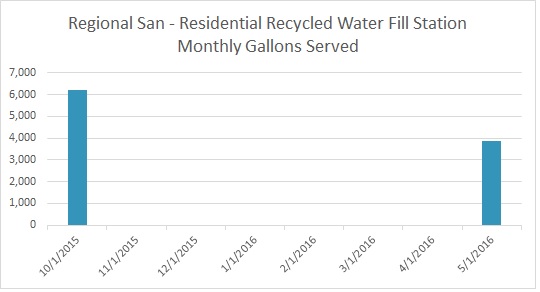
Last year, they ran a pilot fill station for a month and gave away just over 6,200 gallons to 10 registered users. In the three weeks since they’ve re-opened, customers have come 22 times to pick up 3,851 gallons. Total trained users sits at 19 (10 last year, 9 new ones this year). There has been plenty of interest however, 70 people have submitted forms for training (dating back to the launch of their fill station last October).
They have been saturating the public with information about the fill station. “Hopefully more individuals will take advantage of the free recycled water soon!” remarked Mrs. Sargeant.
Delta Diablo
Delta Diablo was recently featured on RecycledH2O in an article titled “Water Resource Recovery Leader: Delta Diablo”.
Located in Antioch, California, Delta Diablo provides wastewater collection and treatment service to nearly 200,000 people in the City of Antioch, City of Pittsburg and the unincorporated community of Bay Point. They process 12 million gallons of wastewater a day and create high quality recycled water for parks, schools, sporting facilities and industrial use. On top of that, Delta Diablo is the lead agency for recycled water policy change in the western United States.
A majority of Delta Diablo’s recycled water is pumped to two power plants which generate more than 1.4 gigawatts of power and the water is used in cooling towers to cool exhaust steam from their turbine generators. Power generated in these power plants is used all around the SF Bay Area.
Last year, Delta Diablo gave away 2,000,000 gallons of recycled water to nearly 500 permitted users. The District provides this “service on a complimentary basis for users to supplement their existing irrigation water supplies.”
Their residential fill station re-opened on April 30th, with plans to run through November 2016. During the month of May, 236,000 gallons* was picked up by 434 registered users. This is an increase of 20 residential haulers compared to last year.
*Delta Diablo annually provides over 2 Billion gallons of recycled water for industrial, municipal, commercial and residential use in East Contra Costa.
“Residents appreciate the service and welcome the chance to do their part to share precious drinking water,” wrote Public Information Manager, Angela Lowrey.
Scotts Valley Water District
Scotts Valley Water District, established in 1961 is located 6 miles north of the City of Santa Cruz, SVWD serves 11,600 people with ‘water for domestic, commercial, municipal and fire fighting purposes. Groundwater is their sole source of potable water for the area. The District maintains a number of ongoing programs to support the sustainable management of the groundwater resource including water use efficiency and the use of recycled water.’
Given their reliance on groundwater, Scotts Valley Water District is in the “planning phase to do an Indirect Potable Reuse (IPR) project,” said Operations Manager David McNair. “With conservation and drought, comes less influent to treat at the wastewater plant.”
Last year, SVWD could only provide free recycled water to city residents due to an agreement between the City of Scotts Valley. This year, a new agreement was created to open the fill station to all District customers, including city residents. The fill station re-opened on May 18th, 2016 and is currently open two days a week, Wednesday and Saturday. Customers can take up to 250 gallons of recycled water per day.
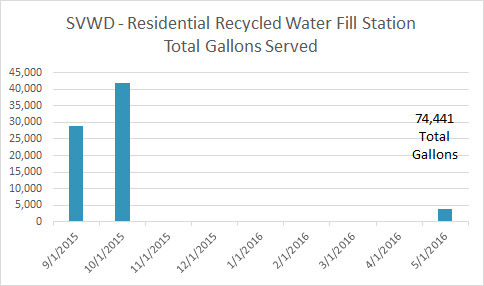
For the month of May, 3,791 gallons of recycled water was hauled away and 3 more customers signed up. This bring their total volume delivered to 74,411 with 73 registered users.
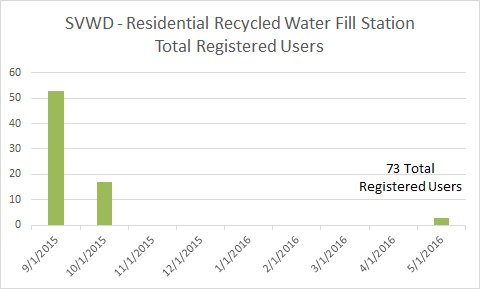
“The fill station has been a great outreach and educational opportunity for us to show our customers a safe and reliable resource that recycled water is now, as well as additional benefits it could provide the community in the future as a water resource.”
City of Brentwood
A long time farming and agriculture community located 55 miles east of San Francisco, the City of Brentwood covers nearly 18 square miles providing public water and wastewater service, as well as provide refuse collection and disposal and a recycling program. Daily flow to the treatment plant averages 3.4 million gallons per day with effluent averages around 2.8 million gallons per day.
The entire flow is treated to Title 22 unrestricted re-use standards, basically creating recycled water from all the water that comes to the treatment plant. The treatment plant uses several hundred thousand gallons per day internally on irrigation at the treatment plant. The vast majority is used on parks and for landscape irrigation throughout town.
Amazingly, the residential recycled water fill station is the place to be. Open 7 days a week (hours changed on June 1st) and supplying 10 hoses with enough pressure to fill an IBC tote in 2-3 minutes, residents have every reason to pick up recycled water. The treatment plant is located about a mile from most people’s homes so it becomes very enticing to go pick up free recycled water.
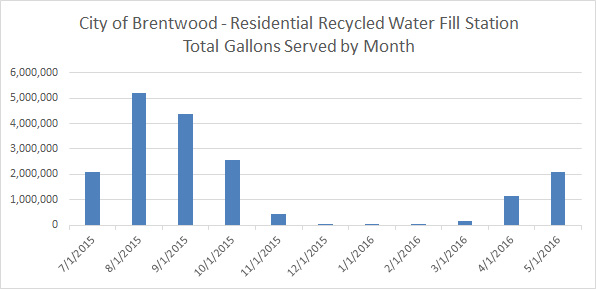
Last month, 5,440 vehicles passed through the fill station hauling away 2,106,000 gallons of recycled water. When temperatures rise, so do the number of vehicles that pass through the fill station. In total, City of Brentwood has given away 18,486,000 gallons of recycled water.
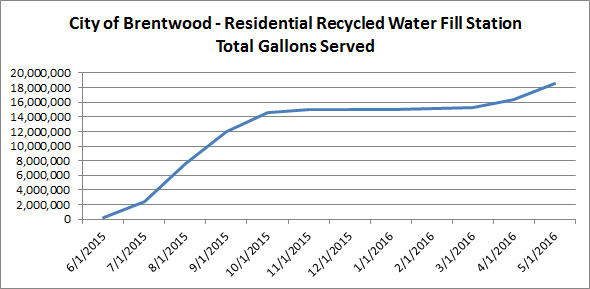
Dublin San Ramon Services District
All of this wouldn’t have been possible if it wasn’t for Dan Gallagher at Dublin San Ramon Services District. It was his wife, Rosalie’ idea to for residents to haul recycled water as a way of conserving drinking water resources. Dan Gallagher is the operations manager at DSRSD, and they are the original residential recycled water fill station agency. Stefanie Olson is responsible for all the behind-the-scenes work involved to make the idea a reality. Stefanie was named 2015 Staff Person of the Year by WateReuse California for her work on the popular Residential Recycled Water Fill Station program.
DSRSD, located in Dublin, California receives about 10 million gallons of wastewater a day from the City of Dublin, City of Pleasanton and parts of the City of San Ramon. DSRSD was founded in 1953 and provides wastewater treatment for approximately 148,000 people. They have produced recycled water for landscape irrigation and construction since 1999. Most notably, DSRSD and East Bay Municipal Utility District (EBMUD) formed the San Ramon Valley Recycled Water Program (also known as DERWA) in 2006. The program serves DSRSD, EBMUD and Pleasanton irrigation customers.
In 2015, DSRSD received 3.6 billion gallons of wastewater and in turn they created 1.03 billion gallons of recycled water at the Jeffrey G. Hansen Water Recycling Plant. Of that volume, 968 million gallons of recycled water was used to irrigate school grounds, parks and roadway medians, 26 million gallons was hauled from the Commercial Fill Station and 28 million gallons was hauled by users of the residential fill station.
So far this year, DSRSD has given away 1,936,000 gallons through their residential fill station. This accounts for about 2.7% of all recycled water produced. The residential fill station is really just a small portion of the entire operation, but has created an excellent opportunity to educate the public on a re-usable and highly desirable water source.
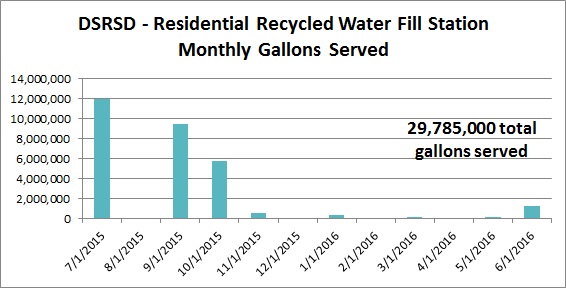
Last month, DSRSD gave away 1,314,000 gallons to 3705 registered users. The number of registered haulers has grown by 59 people. In total, 29,785,000 gallons of recycled water has been hauled away. The most of any fill stations, made possible by being open the longest.
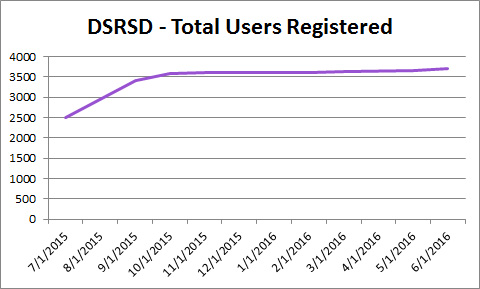
There are many more residential recycled water fill stations in California, these are just a few of them who graciously provided the data for this article. Thank you to everyone involved!
RecycledH2O maintains a google map and list of the other agencies who make recycled water available for residential haulers.

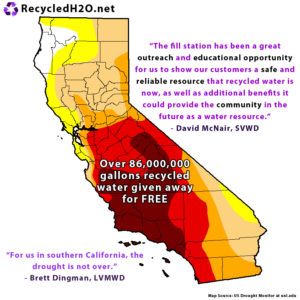
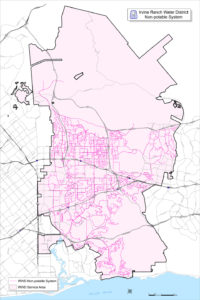
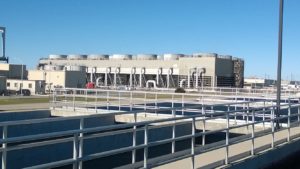
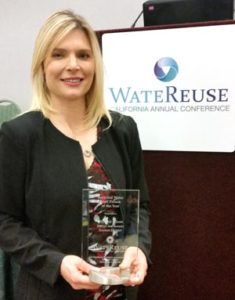
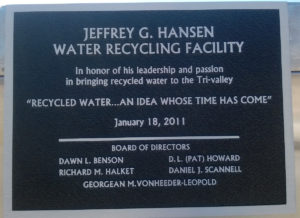
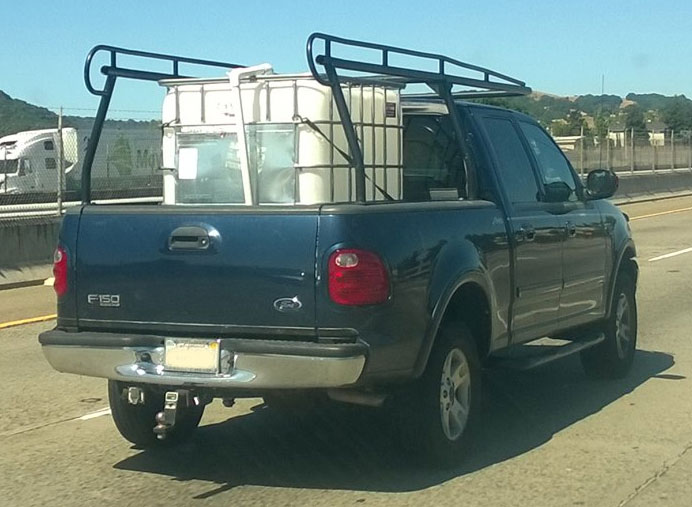
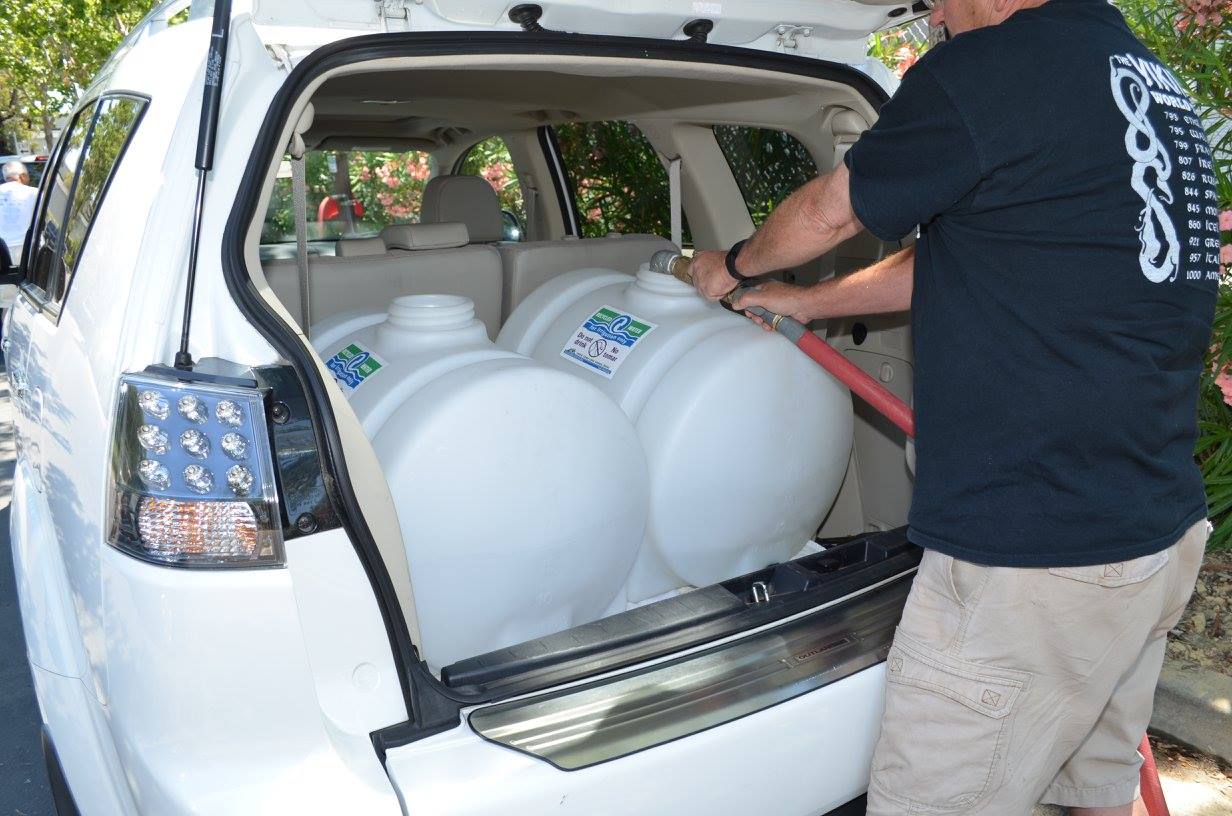
Leave a Reply